- Clone
- EH12.2H7 (See other available formats)
- Regulatory Status
- RUO
- Other Names
- PD-1, PDCD1
- Isotype
- Mouse IgG1, κ
- Ave. Rating
- Submit a Review
- Product Citations
- publications
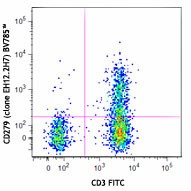
-

Human peripheral blood lymphocytes were stained with CD3 FITC and CD279 (clone EH12.2H7) Brilliant Violet 785™.
| Cat # | Size | Price | Quantity Check Availability | Save | ||
|---|---|---|---|---|---|---|
| 329929 | 25 tests | $237 | ||||
| 329930 | 100 tests | $446 | ||||
Programmed cell death 1 (PD-1), also known as CD279, is a 55 kD member of the immunoglobulin superfamily. CD279 contains the immunoreceptor tyrosine-based inhibitory motif (ITIM) in the cytoplasmic region and plays a key role in peripheral tolerance and autoimmune disease. CD279 is expressed predominantly on activated T cells, B cells, and myeloid cells. PD-L1 (B7-H1) and PD-L2 (B7-DC) are ligands of CD279 (PD-1) and are members of the B7 gene family. Evidence suggests overlapping functions for these two PD-1 ligands and their constitutive expression on some normal tissues and upregulation on activated antigen-presenting cells. Interaction of CD279 ligands results in inhibition of T cell proliferation and cytokine secretion.
Product DetailsProduct Details
- Verified Reactivity
- Human
- Reported Reactivity
- African Green, Baboon, Chimpanzee, Common Marmoset, Cynomolgus, Rhesus, Squirrel Monkey
- Antibody Type
- Monoclonal
- Host Species
- Mouse
- Formulation
- Phosphate-buffered solution, pH 7.2, containing 0.09% sodium azide and BSA (origin USA).
- Preparation
- The antibody was purified by affinity chromatography and conjugated with Brilliant Violet 785™ under optimal conditions.
- Concentration
- Lot-specific (to obtain lot-specific concentration and expiration, please enter the lot number in our Certificate of Analysis online tool.)
- Storage & Handling
- The antibody solution should be stored undiluted between 2°C and 8°C, and protected from prolonged exposure to light. Do not freeze.
- Application
-
FC - Quality tested
- Recommended Usage
-
Each lot of this antibody is quality control tested by immunofluorescent staining with flow cytometric analysis. For flow cytometric staining, the suggested use of this reagent is 5 µl per million cells in 100 µl staining volume or 5 µl per 100 µl of whole blood.
Brilliant Violet 785™ excites at 405 nm and emits at 785 nm. The bandpass filter 780/60 nm is recommended for detection, although filter optimization may be required depending on other fluorophores used. Be sure to verify that your cytometer configuration and software setup are appropriate for detecting this channel. Refer to your instrument manual or manufacturer for support. Brilliant Violet 785™ is a trademark of Sirigen Group Ltd.
Learn more about Brilliant Violet™.
This product is subject to proprietary rights of Sirigen Inc. and is made and sold under license from Sirigen Inc. The purchase of this product conveys to the buyer a non-transferable right to use the purchased product for research purposes only. This product may not be resold or incorporated in any manner into another product for resale. Any use for therapeutics or diagnostics is strictly prohibited. This product is covered by U.S. Patent(s), pending patent applications and foreign equivalents. - Excitation Laser
-
Violet Laser (405 nm)
- Application Notes
-
Additional reported applications (for the relevant formats) include: blocking of ligand binding1-3, immunohistochemical staining of paraformaldehyde fixed frozen sections13, and spatial biology (IBEX)15,16. The LEAF™ purified antibody (Endotoxin <0.1 EU/µg, Azide-Free, 0.2 µm filtered) is recommended for functional assays (Cat. No. 329911 and 329912). For highly sensitive assays, we recommend Ultra-LEAF™ purified antibody (Cat. No. 329926) with a lower endotoxin limit than standard LEAF™ purified antibodies (Endotoxin <0.01 EU/µg).
-
Application References
(PubMed link indicates BioLegend citation) -
- Dorfman DM, et al. 2006 Am. J. Surg. Pathol. 30:802. (FA)
- Radziewicz H, et al. 2007. J. Virol. 81:2545. (FA)
- Velu V, et al. 2007. J. Virol. 81:5819. (FA)
- Zahn RC, et al. 2008. J. Virol. 82:11577. PubMed
- Chang WS, et al. 2008. J. Immunol. 181:6707. (FC) PubMed
- Nakamoto N, et al. 2009. PLoS Pathog. 5:e1000313. (FA)
- Jones RB, et al. 2009. J. Virol. 83:8722. (FC) PubMed
- Vojnov L, et al. 2010. J. Virol. 84:753. (FC) PubMed
- Radziewicz H, et al. 2010. J. Immunol. 184:2410. (FC) PubMed
- Monteriro P, et al. 2011. J. Immunol. 186:4618. PubMed
- Conrad J, et al. 2011. J. Immunol. 186:6871. PubMed
- Salisch NC, et al. 2010. J. Immunol. 184:476. (Rhesus reactivity)
- Li H and Pauza CD. 2015. Eur. J. Immunol. 45:298. (IHC)
- Peterson VM, et al. 2017. Nat. Biotechnol. 35:936. (PG)
- Radtke AJ, et al. 2020. Proc Natl Acad Sci USA. 117:33455-33465. (SB) PubMed
- Radtke AJ, et al. 2022. Nat Protoc. 17:378-401. (SB) PubMed
- Product Citations
-
- RRID
-
AB_11218984 (BioLegend Cat. No. 329929)
AB_11218984 (BioLegend Cat. No. 329930)
Antigen Details
- Structure
- Immunoglobulin superfamily
- Distribution
-
Transiently expressed on CD4- CD8- thymocytes; upregulated in thymocytes and splenic T and B lymphocytes; expressed on activated myeloid cells
- Ligand/Receptor
- B7-H1 (also known as PD-L1) and B7-DC (PD-L2)
- Cell Type
- B cells, Lymphocytes, T cells, Thymocytes, Tregs
- Biology Area
- Cancer Biomarkers, Immunology, Inhibitory Molecules
- Molecular Family
- CD Molecules, Immune Checkpoint Receptors
- Gene ID
- 5133 View all products for this Gene ID
- Specificity (DOES NOT SHOW ON TDS):
- CD279
- Specificity Alt (DOES NOT SHOW ON TDS):
- CD279
- App Abbreviation (DOES NOT SHOW ON TDS):
- FC
- UniProt
- View information about CD279 on UniProt.org
Related FAQs
Other Formats
View All CD279 Reagents Request Custom ConjugationCustomers Also Purchased
Compare Data Across All Formats
This data display is provided for general comparisons between formats.
Your actual data may vary due to variations in samples, target cells, instruments and their settings, staining conditions, and other factors.
If you need assistance with selecting the best format contact our expert technical support team.
-
Brilliant Violet 421™ anti-human CD279 (PD-1)
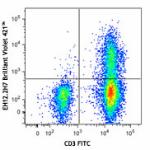
Human peripheral blood lymphocytes were stained with CD3 FIT... 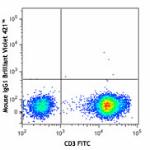
-
Purified anti-human CD279 (PD-1)
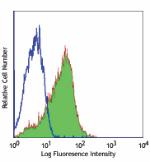
PHA-stimulated (day-3) human peripheral blood lymphocytes we... -
FITC anti-human CD279 (PD-1)
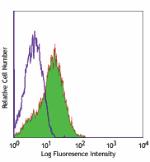
PHA-stimulated (day-3) human peripheral blood lymphocytes we... 
Human peripheral blood lymphocytes were stained with CD279 (... -
PE anti-human CD279 (PD-1)
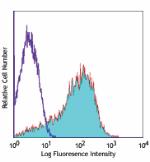
PHA-stimulated (day-3) human peripheral blood lymphocytes we... 
Human peripheral blood lymphocytes were stained with CD279 (... 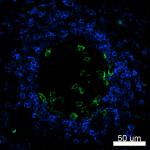
Confocal image of human lymph node sample acquired using the... -
APC anti-human CD279 (PD-1)
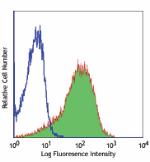
PHA-stimulated (day-3) human peripheral blood lymphocytes we... 
Human peripheral blood lymphocytes were stained with CD279 (... -
Alexa Fluor® 647 anti-human CD279 (PD-1)
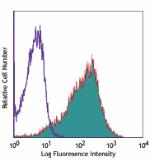
PHA-stimulated (day-3) human peripheral blood lymphocytes we... 
Human peripheral blood lymphocytes were stained with CD279 (... -
PerCP/Cyanine5.5 anti-human CD279 (PD-1)
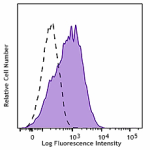
PHA-stimulated (3-day) human peripheral blood lymphocytes we... 
Human peripheral blood lymphocytes were stained with CD3 APC... -
APC/Cyanine7 anti-human CD279 (PD-1)
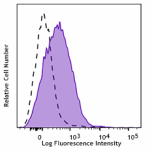
PHA-stimulated (day-3) human peripheral blood lymphocytes st... -
Pacific Blue™ anti-human CD279 (PD-1)
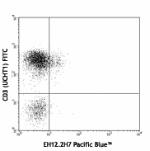
Human peripheral blood lymphocytes were stained with CD279 (... 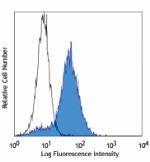
PHA-stimulated (day-3) human peripheral blood lymphocytes we... -
PE/Cyanine7 anti-human CD279 (PD-1)
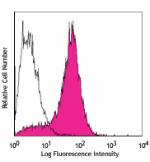
PHA-stimulated (day-3) human peripheral blood lymphocytes we... 
Human peripheral blood lymphocytes were stained with CD279 (... -
Purified anti-human CD279 (PD-1) (Maxpar® Ready)
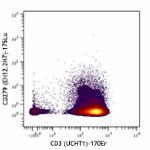
Human PBMCs were incubated for 3 days in media alone (top) o... 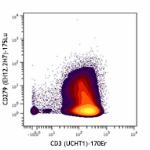
-
Brilliant Violet 605™ anti-human CD279 (PD-1)
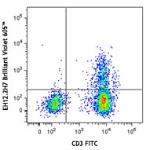
Human peripheral blood lymphocytes were stained with CD3 FIT... -
Ultra-LEAF™ Purified anti-human CD279 (PD-1)
-
Brilliant Violet 711™ anti-human CD279 (PD-1)
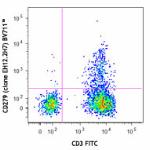
Human peripheral blood lymphocytes were stained with CD3 FIT... -
Brilliant Violet 785™ anti-human CD279 (PD-1)
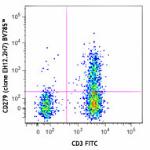
Human peripheral blood lymphocytes were stained with CD3 FIT... -
Brilliant Violet 510™ anti-human CD279 (PD-1)
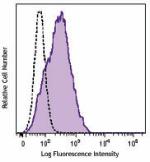
PHA-stimulated (day-3) human peripheral blood lymphocytes we... -
Biotin anti-human CD279 (PD-1)
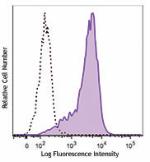
PHA-stimulated (3 days) human peripheral blood lymphocytes w... -
PE/Dazzle™ 594 anti-human CD279 (PD-1)
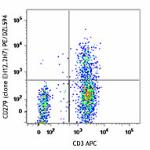
Human peripheral blood lymphocytes were stained with CD3 APC... 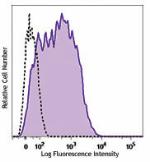
PHA-stimulated (day 3) human peripheral blood lymphocytes st... 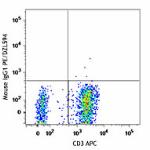
-
Alexa Fluor® 488 anti-human CD279 (PD-1)
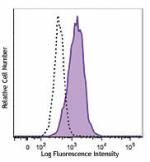
PHA-stimulated (day 3) human peripheral blood lymphocytes we... -
PerCP anti-human CD279 (PD-1)
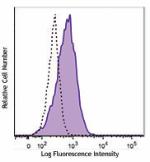
PHA-stimulated (day 3) human peripheral blood lymphocytes we... -
GoInVivo™ Purified anti-human CD279 (PD-1)
Anti-human PD-1 inhibits the binding of PD-L1. Immobilized P... -
Brilliant Violet 650™ anti-human CD279 (PD-1)
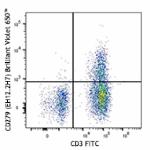
Human peripheral blood lymphocytes were stained with CD3 FIT... 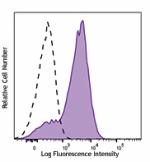
PHA-stimulated (three days) human peripheral blood lymphocyt... 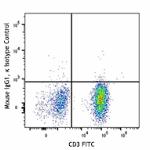
-
Alexa Fluor® 700 anti-human CD279 (PD-1)
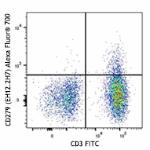
Human peripheral blood lymphocytes were stained with CD3 FIT... 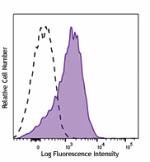
PHA-stimulated (three days) human peripheral blood lymphocyt... 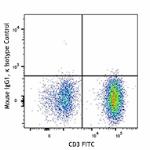
-
APC/Fire™ 750 anti-human CD279 (PD-1)
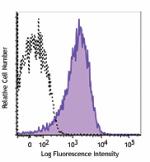
PHA-stimulated (day 3) human peripheral blood lymphocytes we... -
TotalSeq™-A0088 anti-human CD279 (PD-1)
-
TotalSeq™-B0088 anti-human CD279 (PD-1)
-
TotalSeq™-C0088 anti-human CD279 (PD-1)
-
Brilliant Violet 750™ anti-human CD279 (PD-1)
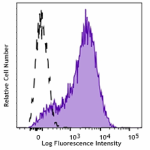
PHA-stimulated (day 3) human peripheral blood lymphocytes we... -
TotalSeq™-D0088 anti-human CD279 (PD-1)
-
PE/Fire™ 640 anti-human CD279 (PD-1)
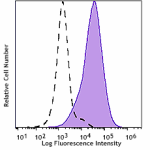
PHA stimulated (day 3) human peripheral blood lymphocytes we... 
Human peripheral blood lymphocytes were stained with anti-hu... -
PE/Cyanine5 anti-human CD279 (PD-1)
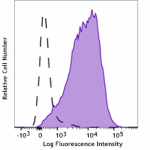
PHA-stimulated (3 days) human peripheral blood lymphocytes w... -
PE/Fire™ 744 anti-human CD279 (PD-1)

PHA-stimulated (3-day) human peripheral blood lymphocytes we... 
Human peripheral blood lymphocytes were stained with anti-hu... -
Spark Red™ 718 anti-human CD279 (PD-1)

PHA-stimulated (3 days) human peripheral blood lymphocytes w... -
Brilliant Violet 570™ anti-human CD279 (PD-1)

PHA-stimulated (3 days) human peripheral blood mononuclear c...
 Login/Register
Login/Register 















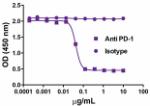



Follow Us